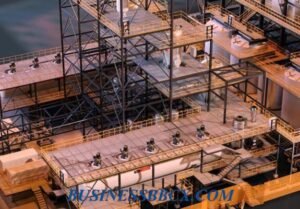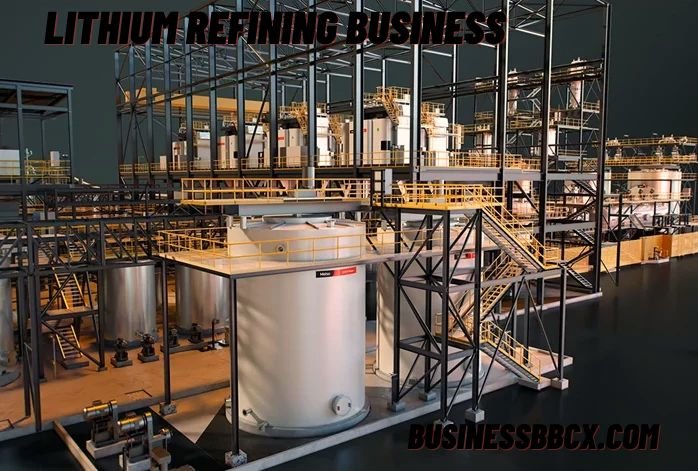In the race toward a sustainable future, lithium has emerged as a cornerstone resource. As a critical component in rechargeable batteries, it powers everything from smartphones to electric vehicles (EVs) and even large-scale energy storage systems. But while lithium mining often grabs headlines, the real magic happens in the refining process. This is where raw lithium is transformed into high-purity materials suitable for modern battery technologies.
In this blog, we’ll explore the lithium refining business, its challenges, opportunities, and its pivotal role in shaping the clean energy revolution.
Table of Contents
ToggleWhat is Lithium Refining?

Lithium refining involves processing lithium-bearing ores or brines into high-purity lithium compounds, such as lithium carbonate or lithium hydroxide. These compounds are the key ingredients for lithium-ion batteries.
The refining process typically includes:
Extraction: Lithium is extracted from ores (like spodumene) or brines.
Purification: Impurities are removed to meet the stringent quality requirements of battery-grade materials.
Conversion: The purified lithium is transformed into usable compounds, primarily lithium carbonate or lithium hydroxide.
Why Lithium Refining is Crucial
Raw lithium is typically extracted from either hard rock deposits or brine pools. However, this raw material is not directly usable for advanced battery technologies. Lithium refining processes convert these raw materials into battery-grade lithium carbonate or lithium hydroxide—compounds with the purity levels and chemical characteristics required for use in high-performance batteries.
The refining process involves several stages, including:
- Crushing and grinding (for hard rock lithium).
- Chemical extraction using reagents to isolate lithium compounds.
- Purification to achieve the necessary 99.5% or higher purity levels.
- Crystallization to produce the final usable products like lithium carbonate or hydroxide.
Booming Demand Driving Growth
The rapid adoption of electric vehicles and the global push toward renewable energy storage are the primary drivers of the lithium refining industry’s growth. As EV production ramps up globally, the demand for battery-grade lithium compounds is expected to surge, with projections estimating a nearly fourfold increase in global lithium demand by 2030.
Key regions leading the demand are:
- China: The world’s largest EV market and battery manufacturer.
- Europe: With strict carbon neutrality goals and EV subsidies.
- United States: Aiming for domestic EV supply chain resilience under initiatives like the Inflation Reduction Act.
Challenges in Lithium Refining
Supply Chain Complexities: Most lithium deposits are geographically concentrated in regions like South America’s Lithium Triangle, Australia, and China. Refining operations, however, are often located far from these extraction sites, creating supply chain inefficiencies.
Environmental Concerns: Lithium refining is resource-intensive, consuming significant amounts of water and energy. Improper waste management can lead to contamination and ecological damage.
Technological Barriers: Refining requires advanced technologies to ensure high purity while minimizing costs. Innovations in refining techniques are critical to meet growing demand sustainably.
Geopolitical Risks: The lithium supply chain is subject to geopolitical dynamics, with countries seeking to secure their lithium resources and processing capabilities.
Opportunities in the Lithium Refining Industry

Expanding Battery Markets: The EV market alone is driving unprecedented demand for lithium. Companies that can refine and supply high-quality lithium compounds are well-positioned to thrive.
Technological Innovations: Emerging technologies in refining and recycling are making the process more efficient and sustainable.
Government Incentives: Many countries are offering subsidies and tax breaks for clean energy projects, including lithium refining facilities.
Vertical Integration: Battery manufacturers are increasingly investing in refining operations to secure their supply chains and reduce dependency on third-party suppliers.
Steps to Enter the Lithium Refining Business

Market Research: Understand the demand-supply dynamics and identify potential customers, such as battery manufacturers.
Secure Resources: Partner with lithium miners or explore opportunities to establish integrated operations.
Invest in Technology: Modern refining requires state-of-the-art facilities to meet the purity levels demanded by the battery industry.
Focus on Sustainability: Adopt eco-friendly practices to reduce your environmental footprint and enhance your market reputation.
Build Partnerships: Collaborate with governments, tech providers, and customers to ensure a steady flow of business.
Future Outlook
The lithium refining industry is poised for significant growth as the world transitions to cleaner energy systems. Investments in technology, sustainability, and infrastructure will be key to navigating the challenges and capitalizing on opportunities. Countries that prioritize refining capabilities will not only meet their domestic needs but also position themselves as global leaders in the lithium economy.
Conclusion
The lithium refining business sits at the crossroads of innovation, sustainability, and economic growth. As the world accelerates its shift to green energy, the role of refined lithium will only grow in significance. For businesses and investors, this presents a golden opportunity to contribute to and benefit from one of the most transformative industries of the 21st century.
By tackling the challenges and embracing the opportunities, the lithium refining sector can not only drive profits but also play a critical role in shaping a sustainable future. Whether you’re an entrepreneur, investor, or policymaker, now is the time to explore the immense potential of the lithium refining industry.
6 FAQs About the Lithium Refining Business
What is the role of the lithium refining business in the battery industry?
The lithium refining business transforms raw lithium extracted from mines or brine pools into high-purity lithium compounds, such as lithium carbonate or lithium hydroxide. These compounds are essential for manufacturing lithium-ion batteries, which power electric vehicles, consumer electronics, and renewable energy storage systems.
What are the primary sources of lithium for the lithium refining business?
Lithium is sourced mainly from two types of deposits: hard rock (like spodumene) and brine pools. Hard rock mining is common in Australia, while brine extraction dominates in the Lithium Triangle of South America (Argentina, Bolivia, and Chile). Both sources require extensive refining to produce battery-grade lithium.
What challenges does the lithium refining business face?
The lithium refining business faces several challenges, including:
- High energy and water consumption, raising environmental concerns.
- Supply chain disruptions due to geographic concentration of lithium resources.
- Technological hurdles in achieving cost-efficient and sustainable refining processes.
- Geopolitical risks, as lithium resources are often located in politically sensitive regions.
How does the lithium refining business contribute to sustainability?
The lithium refining business supports sustainability by enabling the transition to cleaner energy sources. High-purity lithium compounds are critical for electric vehicles and renewable energy storage, which reduce carbon emissions. Additionally, innovations in green refining methods and battery recycling are helping to minimize the industry’s environmental footprint.
Which countries are leading in the lithium refining business?
China currently dominates the lithium refining business, processing the majority of the world’s lithium into battery-grade materials. However, countries like Australia, the United States, and members of the European Union are investing heavily in domestic refining capabilities to reduce reliance on foreign processing.
Is investing in the lithium refining business profitable?
Yes, the lithium refining business is highly profitable due to the soaring demand for lithium-ion batteries. With the rapid growth of the electric vehicle market and renewable energy adoption, global lithium demand is expected to increase significantly, creating lucrative opportunities for investors in refining operations.


